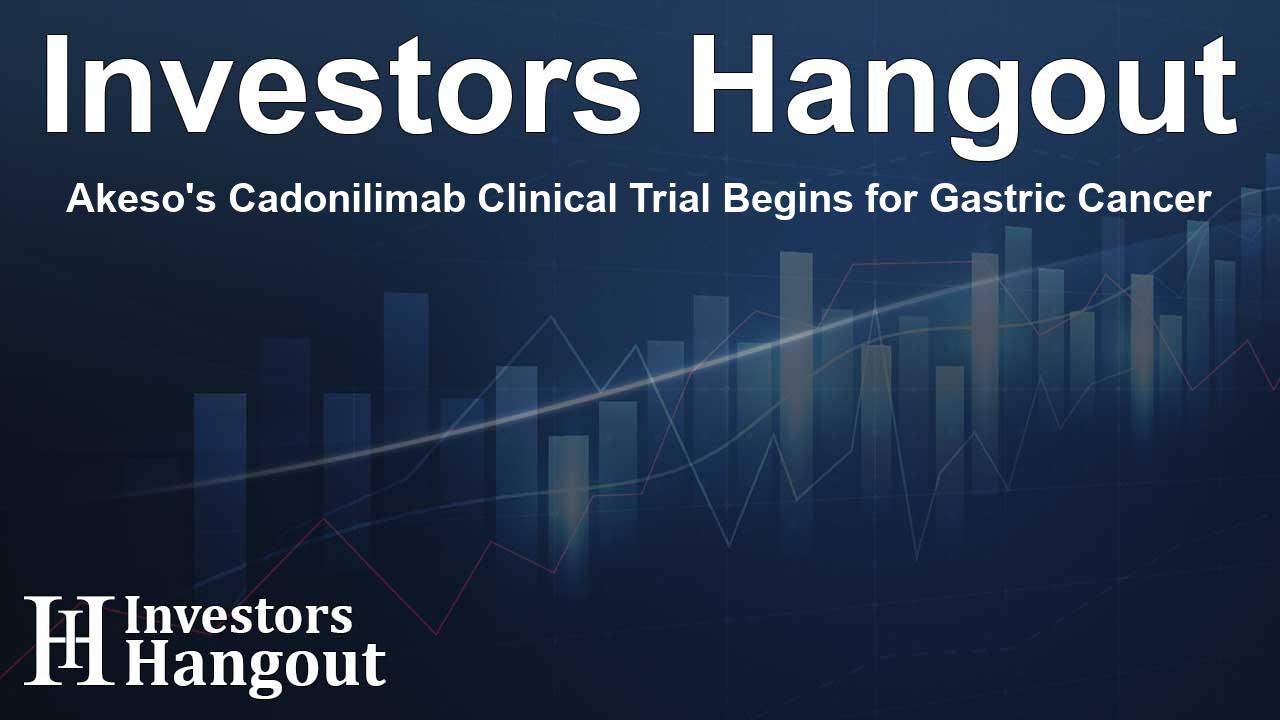Akeso's Cadonilimab Clinical Trial Begins for Gastric Cancer

First Patient Dosed in Pivotal Phase III Trial of Cadonilimab
Akeso, Inc. (9926.HK) has recently announced a significant milestone with the enrollment and dosing of the first patient in a pivotal Phase III clinical trial for cadonilimab, a groundbreaking PD-1/CTLA-4 bispecific antibody. This trial, known as AK104-310/COMPASSION-33, focuses on the combination of cadonilimab with chemotherapy for the perioperative treatment of resectable gastric cancer, particularly adenocarcinoma affecting the gastric and gastroesophageal junction.
Expanding Treatment Horizons for Gastric Cancer
The COMPASSION-33 study is the latest in a series of Phase III trials investigating cadonilimab's role in gastric cancer treatment. Its primary goals include improving the radical resection rates in patients suffering from advanced gastric cancer, reducing recurrence risks, and enhancing overall survival rates. This trial marks a crucial shift in cadonilimab's clinical application, extending from the treatment of unresectable advanced gastric cancer to now include resectable cases, thereby broadening the potential patient pool benefiting from its unique dual-target approach to PD-1 and CTLA-4.
Prior Success in Advanced Gastric Cancer
Cadonilimab has already demonstrated its effectiveness as a first-line treatment for advanced gastric cancer in China. It shows promising results across various levels of PD-L1 expression, making it a versatile option for patients regardless of their tumors' PD-L1 status. Additionally, a Phase III registration trial is underway, which evaluates cadonilimab's effectiveness combined with pulocimab (VEGFR-2) specifically for immune therapy-resistant gastric cancer. This trial provides hope for new, effective second-line treatment options in a population that desperately needs them.
Addressing Unmet Needs in Perioperative Cancer Therapy
Currently, worldwide options for perioperative immunotherapy remain largely unavailable, highlighting a critical gap in treatment options for gastric cancer patients. Early data suggest that cadonilimab may outperform existing PD-1 therapies in terms of efficacy and safety for treating G/GEJ adenocarcinoma during the perioperative period. As the first PD-1/CTLA-4 bispecific antibody available commercially, cadonilimab targets both mechanisms simultaneously, thereby enhancing survival rates and significantly reducing death risks in patients across all PD-1 expression levels. This is especially impressive given that current PD-1 therapies have shown minimal effectiveness in patients with lower or negative PD-L1 levels.
Clinical Benefits Over Existing Treatments
Cadonilimab’s ability to provide a clinically meaningful survival benefit for patients who previously had limited options makes it a revolutionary treatment. Compared to traditional PD-1 therapies, cadonilimab has shown superior survival advantages in patients with higher PD-L1 levels as well, reinforcing its status as an innovative frontrunner in gastric cancer therapies.
About Akeso and Its Innovative Approach
Founded in 2012, Akeso (HKEX: 9926.HK) has developed a reputation as a leading biopharmaceutical company focused on creating cutting-edge biological medicines. The company has established an integrated research and development framework which includes the ACE Platform and advanced bi-specific antibody drug technologies. With over 50 innovative assets in its pipeline, Akeso is committed to addressing major diseases, including cancer, autoimmune conditions, and metabolic disorders.
Akeso operates a comprehensive drug development process from inception through commercialization, with 24 candidates already in clinical trials. This includes a variety of bispecific and multi-specific antibody formulations, demonstrating Akeso's ongoing commitment to innovation and patient care.
Frequently Asked Questions
What is cadonilimab, and how does it work?
Cadonilimab is a PD-1/CTLA-4 bispecific antibody that targets two important checkpoints in cancer therapy, potentially enhancing treatment effectiveness against various cancer types.
Why is the trial significant for gastric cancer treatment?
This trial potentially offers new hope for patients with resectable gastric cancer by expanding treatment options with cadonilimab in combination with chemotherapy.
What are the anticipated outcomes of the COMPASSION-33 trial?
The trial aims to improve surgical resection rates, lower recurrence risks, and enhance overall survival for patients affected by advanced gastric cancer.
When are the results of the trial expected to be available?
While specific timelines for results are not disclosed, ongoing patient enrollment and dosing signal that preliminary data could be available in the coming years.
What makes Akeso a notable biopharmaceutical company?
Akeso stands out for its integrated R&D approach, innovative drug platform, and commitment to developing first-in-class therapies that can significantly benefit patients worldwide.
About The Author
Contact Dylan Bailey privately here. Or send an email with ATTN: Dylan Bailey as the subject to contact@investorshangout.com.
About Investors Hangout
Investors Hangout is a leading online stock forum for financial discussion and learning, offering a wide range of free tools and resources. It draws in traders of all levels, who exchange market knowledge, investigate trading tactics, and keep an eye on industry developments in real time. Featuring financial articles, stock message boards, quotes, charts, company profiles, and live news updates. Through cooperative learning and a wealth of informational resources, it helps users from novices creating their first portfolios to experts honing their techniques. Join Investors Hangout today: https://investorshangout.com/
The content of this article is based on factual, publicly available information and does not represent legal, financial, or investment advice. Investors Hangout does not offer financial advice, and the author is not a licensed financial advisor. Consult a qualified advisor before making any financial or investment decisions based on this article. This article should not be considered advice to purchase, sell, or hold any securities or other investments. If any of the material provided here is inaccurate, please contact us for corrections.
